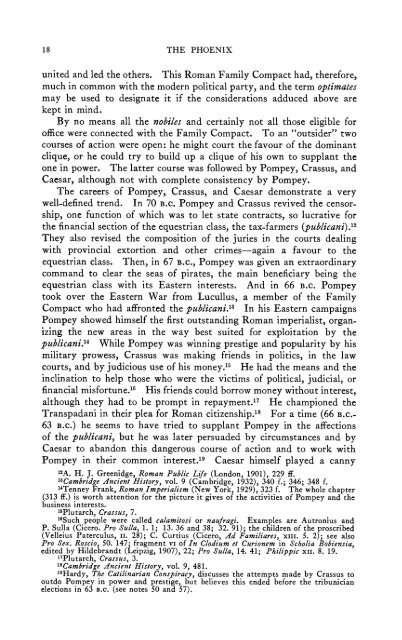Catiline and the "Concordia Ordinum" - Historia Antigua
Catiline and the "Concordia Ordinum" - Historia Antigua
Catiline and the "Concordia Ordinum" - Historia Antigua
You also want an ePaper? Increase the reach of your titles
YUMPU automatically turns print PDFs into web optimized ePapers that Google loves.
18 THE PHOENIX<br />
united <strong>and</strong> led <strong>the</strong> o<strong>the</strong>rs. This Roman Family Compact had, <strong>the</strong>refore,<br />
much in common with <strong>the</strong> modern political party, <strong>and</strong> <strong>the</strong> term optimates<br />
may be used to designate it if <strong>the</strong> considerations adduced above are<br />
kept in mind.<br />
By no means all <strong>the</strong> nobiles <strong>and</strong> certainly not all those eligible for<br />
office were connected with <strong>the</strong> Family Compact. To an "outsider" two<br />
courses of action were open: he might court <strong>the</strong> favour of <strong>the</strong> dominant<br />
clique, or he could try to build up a clique of his own to supplant <strong>the</strong><br />
one in power. The latter course was followed by Pompey, Crassus, <strong>and</strong><br />
Caesar, although not with complete consistency by Pompey.<br />
The careers of Pompey, Crassus, <strong>and</strong> Caesar demonstrate a very<br />
well-defined trend. In 70 B.C. Pompey <strong>and</strong> Crassus revived <strong>the</strong> censorship,<br />
one function of which was to let state contracts, so lucrative for<br />
<strong>the</strong> financial section of <strong>the</strong> equestrian class, <strong>the</strong> tax-farmers (publicani).12<br />
They also revised <strong>the</strong> composition of <strong>the</strong> juries in <strong>the</strong> courts dealing<br />
with provincial extortion <strong>and</strong> o<strong>the</strong>r crimes-again a favour to <strong>the</strong><br />
equestrian class. Then, in 67 B.c., Pompey was given an extraordinary<br />
comm<strong>and</strong> to clear <strong>the</strong> seas of pirates, <strong>the</strong> main beneficiary being <strong>the</strong><br />
equestrian class with its Eastern interests. And in 66 B.C. Pompey<br />
took over <strong>the</strong> Eastern War from Lucullus, a member of <strong>the</strong> Family<br />
Compact who had affronted <strong>the</strong> publicani.'3 In his Eastern campaigns<br />
Pompey showed himself <strong>the</strong> first outst<strong>and</strong>ing Roman imperialist, organizing<br />
<strong>the</strong> new areas in <strong>the</strong> way best suited for exploitation by <strong>the</strong><br />
publicani.14 While Pompey was winning prestige <strong>and</strong> popularity by his<br />
military prowess, Crassus was making friends in politics, in <strong>the</strong> law<br />
courts, <strong>and</strong> by judicious use of his money.'5 He had <strong>the</strong> means <strong>and</strong> <strong>the</strong><br />
inclination to help those who were <strong>the</strong> victims of political, judicial, or<br />
financial misfortune.'6 His friends could borrow money without interest,<br />
although <strong>the</strong>y had to be prompt in repayment." He championed <strong>the</strong><br />
Transpadani in <strong>the</strong>ir plea for Roman citizenship."8 For a time (66 B.C.-<br />
63 B.C.) he seems to have tried to supplant Pompey in <strong>the</strong> affections<br />
of <strong>the</strong> publicani, but he was later persuaded by circumstances <strong>and</strong> by<br />
Caesar to ab<strong>and</strong>on this dangerous course of action <strong>and</strong> to work with<br />
Pompey in <strong>the</strong>ir common interest.19 Caesar himself played a canny<br />
12A. H. J. Greenidge, Roman Public Life (London, 1901), 229 ff.<br />
13Cambridge Ancient History, vol. 9 (Cambridge, 1932), 340 f.; 346; 348 f.<br />
14Tenney Frank, Roman Imperialism (New York, 1929), 323 f. The whole chapter<br />
(313 ff.) is worth attention for <strong>the</strong> picture it gives of <strong>the</strong> activities of Pompey <strong>and</strong> <strong>the</strong><br />
business interests.<br />
15Plutarch, Crassus, 7.<br />
16Such people were called calamitosi or naufragi. Examples are Autronius <strong>and</strong><br />
P. Sulla (Cicero. Pro Sulla, 1. 1; 13. 36 <strong>and</strong> 38; 32. 91); <strong>the</strong> children of <strong>the</strong> proscribed<br />
(Velleius Paterculus, II. 28); C. Curtius (Cicero, Ad Familiares, xiix. 5. 2); see also<br />
Pro Sex. Roscio, 50. 147; fragment vi of In Clodium et Curionem in Scholia Bobiensia,<br />
edited by Hildebr<strong>and</strong>t (Leipzig, 1907), 22; Pro Sulla, 14. 41; Philippic xii. 8. 19.<br />
17Plutarch, Crassus, 3.<br />
18Cambridge Ancient History, vol. 9, 481.<br />
"9Hardy, The Catilinarian Conspiracy, discusses <strong>the</strong> attempts made by Crassus to<br />
outdo Pompey in power <strong>and</strong> prestige, but believes this ended before <strong>the</strong> tribunician<br />
elections in 63 B.C. (see notes 50 <strong>and</strong> 57).

















